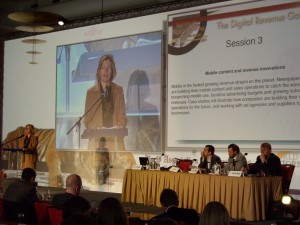A range of mobile experts at the WAN World Digital Publishing Conference gave a more optimistic picture than at the AOP summit earlier this month, where speakers, including ITV’s head of mobile, said that we are still waiting for the year of mobile.
But in Amsterdam, just a few weeks later, that sentiment was turned on its head. That next year will be the year of mobile is what people have said each year for five years, said Ilicco Elia, head of mobile for Reuters. No, ‘it’s here’, he told the assembled range of newspaper experts at the World Digital Publishing Conference 2008.
Where as Elia once was employed in ’emerging media’ for Reuters, he now very much part of the mainstream product: “mobile has since emerged,” he said.
Elia certainly objected to one of Martha Stone’s slides during her presentation on online media, which said ‘mobile advertising to become a real business in a few years’. ‘My boss will shoot me, if he sees that’ he said. Elia’s been telling him that is already the case for a while; it is a real business.
While Elia stressed that he did not think “you should be going into mobile to make a lot of money immediately.” He said, “you can make more and more money slowly, slowly. Integrate into the rest of your products and it will come.”
His presentation touched on examples where Reuters have successfully monetized mobile: in the IBM ‘Stop Talking, Start Doing’ campaign (a slogan that should be applied to mobile, Elia said); by using Nokia phone cameras on for fast and effective reporting, and for widgets on iGoogle.
To think about search engine optimisation (SEO) is “a complete and utter given,” he said.
“You have to do it – SEO and SE marketing – and it is a cheap way to send people to your site,” he said.

The other mobile speakers sharing the stage, Jorma Härknönen, the senior vice president at MTV Media in Finland, responsible for internet and consumer businesses said were of similar opinion and Fredrik Oscarson, the founder and VP new business director for Mobiento, a Sweden based mobile marketing agency, were of similar opinion.
“Give it five years time, and I think people will choose to surf news on the mobile, because the mobile will have functionality [e.g GPS] that the internet doesn’t,” Fredrik Oscarson told Journalism.co.uk.
A short interview with Oscarson can be listened to here. He talks about mobile content for newspapers and different ways of advertising on mobile.
[audio:http://www.journalism.co.uk/sounds/Oscarson.MP3]
